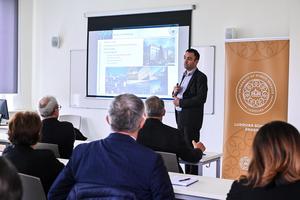The fields of application of artificial intelligence (AI) were presented by Jonatan Lerga, professor at the University of Rijeka, as part of the Ludovika Scholars guest lecturer program of the University of Public Service at the Education Center on October 24. In addition to medical technologies, at the public lecture he also discussed the general use of data and machine learning.
Explaining in detail the work of the Center for Artificial Intelligence and Cybersecurity of the University of Rijeka, Professor Jonatan Lerga emphasized that their most important task is to be able to provide continuous assistance in responding to the challenges created by society and new technology. Therefore, within the framework of Artificial Intelligence (AI) research, the experts deal not only with mathematics, but also with aspects of cyber security - he emphasized, adding: the workshop work takes place in sixteen different professional groups within the research center, from digital technology to medicine preparation methods in education.
"Regarding artificial intelligence, the good news is that you don't need to understand mathematics, the bad news is that this field is difficult to explain," predicted the Croatian expert. The basis of everything within the field of science is the teaching of AI, mathematics is needed for algorithm programming, but it is necessary to deal with big data management. Cyber security research is only one research area where these complex AI systems are applied. As an interesting fact, Lerga noted: the first direct observation of gravitational waves took place in 2015, for which three physicists - Rainer Weiss, Barry C. Barish and Kip S. Thorne - received the Nobel Prize in 2017.
In the case of medicine, which is considered to be one of the most important fields, with the help of artificial intelligence, they are already able to clean up medical images, such as, for example, lesions that are not visible to the eye that can be extracted from MR or X-ray images. Jonatan Lerga mentioned components and entropies that were developed by the Hungarian mathematician Alfréd Rényi during the development of the number theory of probability are also used during AI research. According to the expert, the most "exciting" field of research is AI assisting electroencephalography (EEG) examinations, which deals with the physiological background of psychological functioning. The signal that can be derived with EEG is the electroencephalogram, which can be described as a complex, multi-component periodic curve. In addition, among the research groups, there is also one where they try to clean the images taken in the tubes and under water.
The research area best known to the general public is the self-learning of machines, in which case, according to Jonatan Lerga, it is very important to emphasize: human knowledge is needed in order for the machine to know in which direction to go. Analyzing cryptography in detail, the professor emphasized: the development of these algorithms clearly contributes to the development of everyday technologies.
Finally, he outlined the collaborational opportunities in which cooperation can be established between the two universities or even UPS students can get involved in the work taking place in Rijeka.
Text: Pap Melinda Patrícia, Ádám Réka
Photo: Szilágyi Dénes
